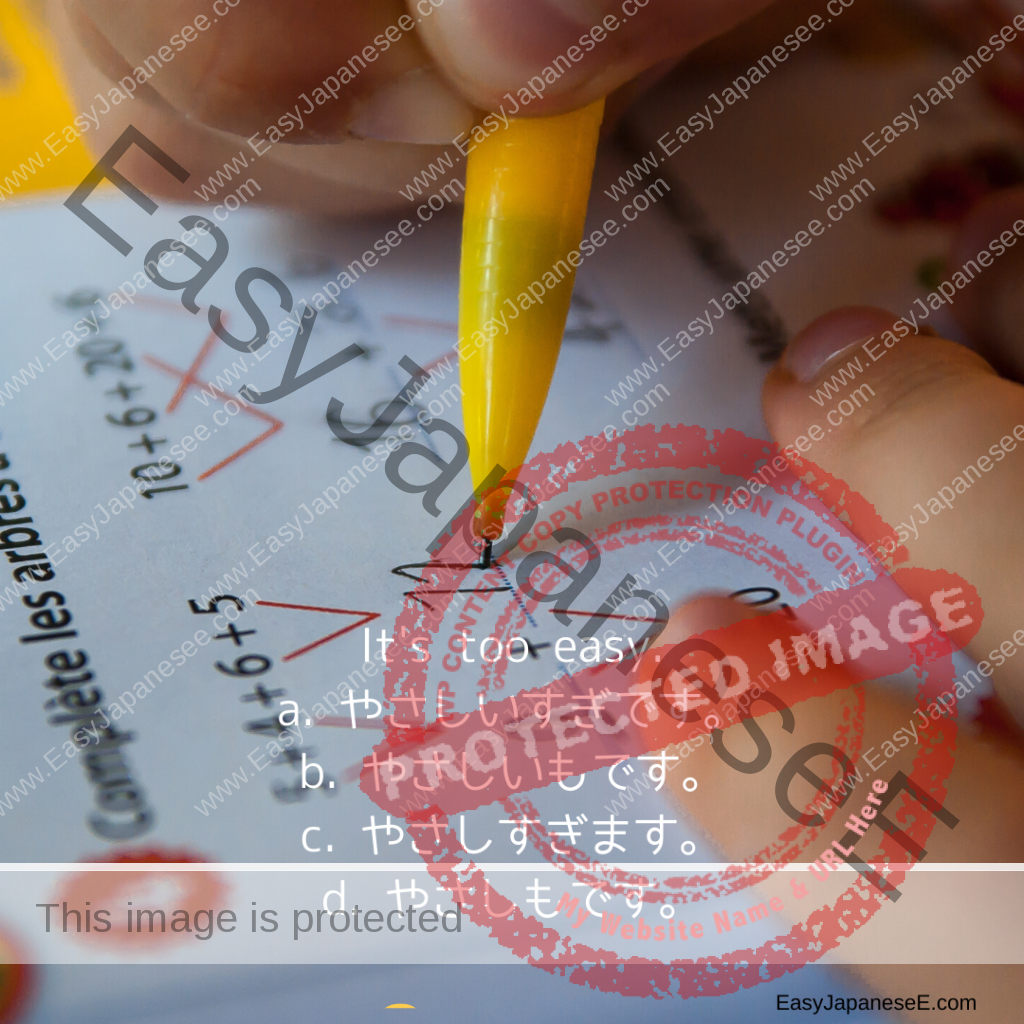It’s too easy.
a. やさしいすぎです。
b. やさしいもです。
c. やさしすぎます。
d. やさしもです。

The correct answer is c.
This “too” means “excessively” so the expression “[verb/adjective stem] + すぎ” has to be used. やさしい is an いadjective, so its stem is やさし, not やさしい. Thus the choice a. has to be eliminated.
If this “too” means “also (as in “me, too”),it is usually translated with the word も like わたしも but this is not the case here.
Connection
- [verb stem] + すぎます
- [いadj stem] + すぎます
- [なadj] + すぎます
Examples
きのうは のみすぎました。(←のみます)
I had too much drink yesterday.いつも チョコレートを たべすぎます。(←たべます)
I always eat too much chocolate.この チョコレートは あますぎます。(←あまい)
This chocolate is too sweet.あのせんせいは きびしすぎました。(←きびしい)
That teacher was too strict.ジョンさんは まじめすぎます。
John is too serious.この もんだいは かんたん すぎます。
This question is too easy.
More Adjectives you can use in this pattern
| あたらしい | いadj | new |
| うすい | いadj | thin, pale, sparce |
| おもい | いadj | heavy |
| かるい | いadj | light, non-serious, minor |
| きたない | いadj | dirty, messy |
| たかい | いadj | tall, high |
| たかい | いadj | expensive |
| つまらない | いadj | insignificant, boring |
| つめたい | いadj | cold (to the touch) |
| ながい | いadj | long |
| はやい | いadj | quick, fast |
| ひくい | いadj | short, low |
| ふるい | いadj | old (not person), aged, ancient |
| まるい | いadj | round, circular |
| みじかい | いadj | short (opposite of long) |
| やすい | いadj | cheap, inexpensive |
| よわい | いadj | weak, feeble |
| わるい | いadj | bad, inferior |
| いろいろ | なadj | various |
| じょうぶ | なadj | strong, solid, durable |
| たいせつ | なadj | important |
| べんり | なadj | convenient, handy |
Suggested Activities
- Make a few sentences for each of the above adjectives.
If you are studying for JLPT N4/N5 level, I think you should stop reading this here.
For more Advanced Learners
Some very observant and advanced readers may now ask, what about the difference between a. すぎです and c. すぎます, so I will add a bit more.
In this case, やさしすぎです (as long as you got rid of い) and やさしすぎます are both OK and they don’t have much difference in their meaning.
However, すぎ in すぎです is a noun while すぎます is a verb, so that grammatical difference can bring some difference in the meaning if you are using a verb stem before ます.
For example, if I compare たべすぎます and たべすぎです, たべすぎます with the verb ending means “to eat excessively,” so you are talking about a person‘s* action while たべすぎです with です ending means “to be over-eating”, so you are talking about an occasion.
If I see my friend drinking a lot, I would say:
のみすぎですよ (it is an excessive drinking) but I won’t say のみすぎますよ as I am not sure how much more he/she can tolerate at this moment.
Similarly, if I have made an overstatement and if I want to apologize for it, I would say:
(わたしは)いいすぎました。ごめんなさい。
but if I am pointing out somebody else’s overstatement, I would say:
(それは)いいすぎですよ。
or
(それは)いいすぎだと おもいますよ。
because I’m talking about the overstatement, NOT about the person.
Now, I have been using the polite form so far but if I change these into the plain, they look VERY similar:
たべすぎた。(←たべすぎました)I ate too much.
たべすぎだ。(←たべすぎです)It is over-eating.
So remember:
~すぎた: talking about a person’s* past excessive action
~すぎだ: talking about a current occasion which seems excessive.
Foot Note
I said “a person‘s* action.” Precisely speaking, it should read “the subject’s action.” The subject can be an animal or a thing like trains but for the time being, I will leave it as “a person’s action.”
![[stem] + すぎ ます/です](https://www.easyjapanesee.com/wp-content/uploads/2020/05/200601-sugimasu-e1590972099712.png)
